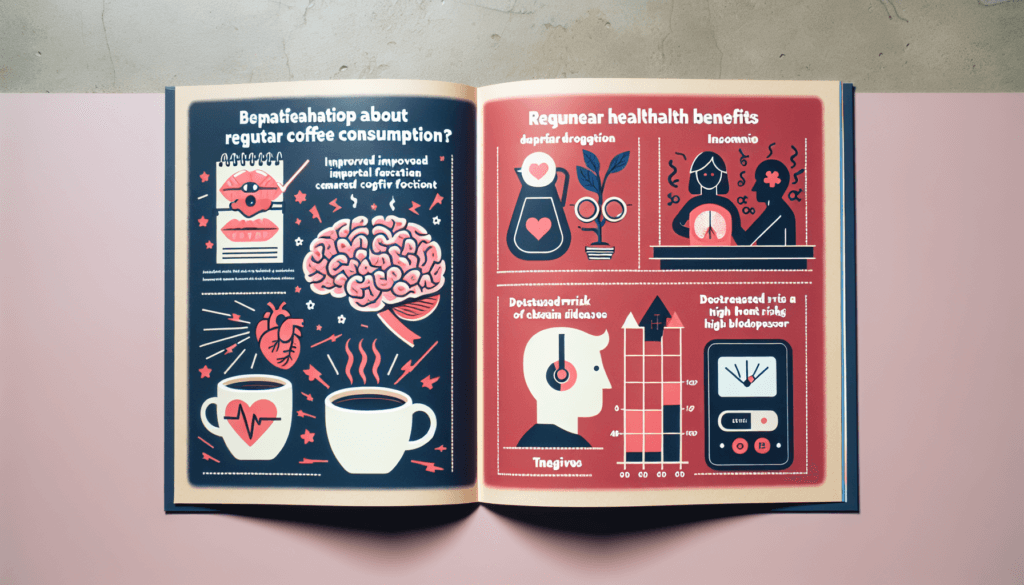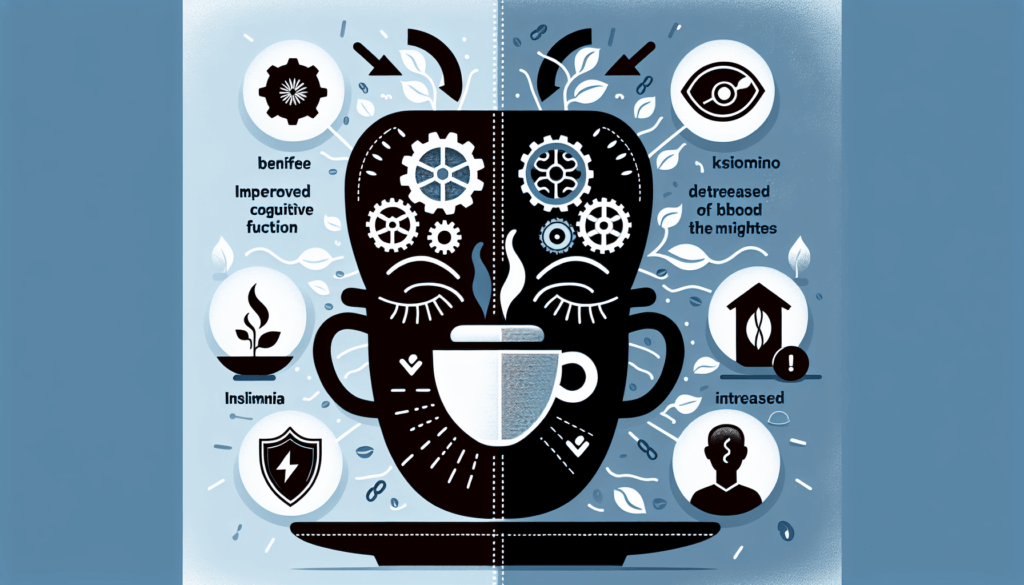Do you start your day with a cup of coffee? Many people rely on their morning java to kickstart their day and keep them energized. But have you ever wondered if it’s actually good for you to drink coffee every day? While opinions on this may vary, there are some potential benefits you should know about. Studies have shown that moderate coffee consumption can improve brain function, boost metabolism, and even lower the risk of certain diseases. However, it’s important to note that excessive intake may lead to negative effects such as increased anxiety and disrupted sleep patterns. So, let’s explore the topic further and find out if your daily coffee habit can be considered a healthy one.
Health Benefits of Drinking Coffee
Increased alertness and energy
Drinking coffee can give you a much-needed boost of alertness and energy. The caffeine in coffee stimulates the central nervous system, blocking the effects of adenosine, a neurotransmitter that promotes sleepiness. By blocking adenosine, coffee helps you stay awake and focused, making it an excellent choice for those early mornings or long study sessions.
Improved cognitive function
Research has shown that drinking coffee is linked to improved cognitive function. The caffeine in coffee acts as a mild stimulant, enhancing memory, attention, and concentration. It can help you stay focused and mentally sharp, making it a popular choice for those who need a mental boost throughout the day.
Enhanced physical performance
If you are an exercise enthusiast, you’ll be pleased to know that coffee can enhance your physical performance. The caffeine in coffee stimulates the release of adrenaline, which can increase stamina and improve endurance. It can also help reduce muscle pain and fatigue, allowing you to push harder during your workouts or physical activities.
Reduced risk of chronic diseases
The health benefits of coffee extend beyond just providing a temporary energy boost. Studies have shown that regular coffee consumption is associated with a reduced risk of chronic diseases such as type 2 diabetes, Parkinson’s disease, and certain types of cancer. The powerful antioxidants found in coffee, such as chlorogenic acid, may contribute to these protective effects.
Protection against liver damage
Coffee has shown to have a protective effect on the liver. It can help prevent liver diseases such as liver cirrhosis and liver cancer. Some studies have even suggested that coffee drinkers have a lower risk of developing liver diseases compared to non-coffee drinkers. The exact mechanisms behind this protective effect are still being studied, but it could be attributed to the anti-inflammatory and antioxidant properties of coffee.
Lower risk of stroke
Regular coffee consumption has also been associated with a lower risk of stroke. A study conducted by the American Heart Association found that individuals who drank one to two cups of coffee a day had a 10% lower risk of stroke compared to those who didn’t drink coffee. The caffeine and antioxidant content in coffee may have a protective effect on the blood vessels, reducing the risk of clot formation and improving blood flow to the brain.
Potential Risks of Drinking Coffee
Caffeine addiction and dependence
One potential risk of drinking coffee is the development of caffeine addiction and dependence. Caffeine is a psychoactive substance, and regular consumption can lead to the body becoming dependent on it to function properly. When caffeine intake is abruptly stopped, withdrawal symptoms such as headaches, fatigue, and irritability may occur. It is important to consume coffee in moderation and be mindful of your caffeine intake.
Negative effects on sleep quality
While coffee can help keep you awake during the day, consuming it too close to bedtime can negatively impact your sleep quality. The stimulating effects of caffeine can make it difficult to fall asleep or stay asleep throughout the night. It is advisable to avoid consuming coffee at least four to six hours before bedtime to ensure a restful night’s sleep.
Increased anxiety and restlessness
Individuals who are prone to anxiety or have anxiety disorders may experience increased symptoms when consuming coffee. The stimulant effects of caffeine can lead to increased heart rate, restlessness, and feelings of anxiety or jitteriness. If you are prone to anxiety, it is best to limit or avoid coffee consumption to prevent exacerbation of symptoms.
Digestive issues and acid reflux
Coffee can also have negative effects on the digestive system for some individuals. The high acidity content of coffee can lead to digestive issues such as acid reflux, heartburn, and stomach discomfort. If you are susceptible to these conditions, it may be beneficial to opt for low-acid or decaffeinated coffee to minimize the risk of digestive discomfort.
Rapid heart rate and high blood pressure
Some individuals may experience a rapid heart rate or an increase in blood pressure after consuming coffee. While this is generally temporary and not a concern for most people, those with existing cardiovascular conditions should be cautious with their coffee intake. If you have high blood pressure or a heart condition, it is advisable to consult with your healthcare provider regarding the appropriate amount of coffee for you.
Possible impact on bone health
There has been some evidence suggesting a potential link between coffee consumption and decreased bone mineral density, which could increase the risk of osteoporosis and fractures. However, the evidence is not conclusive, and the relationship between coffee and bone health is complex. Factors such as calcium intake, vitamin D levels, and overall diet also play a significant role in bone health. It is best to maintain a balanced diet and consult with a healthcare professional for personalized advice on bone health.

Caffeine Content and Sensitivity
Varied caffeine content in different types of coffee
The caffeine content in coffee can vary depending on several factors, including the type of coffee bean, the brewing method, and the serving size. On average, an 8-ounce cup of brewed coffee contains about 95 milligrams of caffeine. However, it is essential to note that caffeine content can range from as little as 30 milligrams to as much as 200 milligrams or more in specialty coffee or espresso drinks. It is crucial to be aware of the caffeine content in the coffee you consume to manage your overall intake.
Factors affecting individual caffeine sensitivity
Individuals can have varying levels of sensitivity to caffeine. Factors such as genetics, age, body weight, and overall health can influence how your body processes and reacts to caffeine. Some individuals may be more susceptible to the stimulating effects of caffeine, while others may experience little to no noticeable effects. It is important to pay attention to your body’s response and adjust your caffeine intake accordingly.
Recommended daily caffeine intake
The recommended daily caffeine intake varies depending on several factors, including age, overall health, and sensitivity to caffeine. The Food and Drug Administration (FDA) considers up to 400 milligrams of caffeine per day to be generally safe for healthy adults. This is equivalent to about 4 cups of brewed coffee. However, it is essential to consider individual tolerance levels and potential interactions with other substances or medications. It is always best to consult with a healthcare professional to determine the appropriate caffeine intake for you.
Signs of caffeine overdose
Consuming excessive amounts of caffeine can lead to caffeine overdose, also known as caffeine toxicity. Symptoms of caffeine overdose may include restlessness, rapid heartbeat, dizziness, tremors, nausea, and even seizures. If you experience any of these symptoms after consuming coffee, it is important to seek medical attention immediately. Caffeine overdose can be especially dangerous for individuals with pre-existing health conditions or who are sensitive to caffeine.
Considerations for Specific Individuals
Pregnant and breastfeeding women
Pregnant and breastfeeding women should take special precautions when it comes to coffee consumption. The caffeine in coffee can cross the placenta and be transferred to the developing fetus or through breast milk to the baby. High caffeine intake during pregnancy has been linked to an increased risk of preterm birth and low birth weight. It is generally advisable for pregnant women to limit their caffeine intake to no more than 200 milligrams per day, equivalent to about one 12-ounce cup of brewed coffee. Breastfeeding women should also be mindful of their caffeine intake and consider reducing it if their baby shows signs of irritability or difficulty sleeping.
Children and adolescents
Caffeine consumption in children and adolescents should be monitored closely. Their developing bodies and brains are more sensitive to the effects of caffeine, and high caffeine intake can interfere with their sleep, hydration, and overall health. The American Academy of Pediatrics recommends that children and adolescents avoid energy drinks altogether and limit their caffeine intake from other sources, including coffee. It is crucial for parents and caregivers to promote healthy habits and educate children about the potential risks of excessive caffeine consumption.
People with health conditions
Individuals with certain health conditions should be cautious with coffee consumption. For example, those with gastroesophageal reflux disease (GERD) may find that coffee exacerbates their symptoms. People with irritable bowel syndrome (IBS) or other digestive disorders may also experience increased discomfort after consuming coffee due to its acidity and stimulating effects. Additionally, individuals with heart conditions or high blood pressure should carefully manage their caffeine intake. It is always recommended to consult with a healthcare professional for personalized advice on coffee consumption based on specific health conditions.
Individuals taking medications
Certain medications can interact with caffeine, either enhancing or diminishing its effects. For example, some medications for asthma, depression, or heart conditions can be affected by caffeine. It is important to consult with your healthcare provider or pharmacist regarding any potential interactions between your medications and coffee. They can provide tailored advice and help determine the appropriate caffeine intake for you based on your specific medications.
People with anxiety disorders
Individuals with anxiety disorders may want to limit or avoid coffee consumption due to its stimulating effects. The caffeine in coffee can increase heart rate, trigger restlessness, and exacerbate symptoms of anxiety. It is best to listen to your body and prioritize your mental well-being. Opting for decaffeinated coffee or exploring herbal alternatives may be a suitable option for individuals with anxiety disorders.
Effects on sleep for night-shift workers
Night-shift workers often rely on coffee to help them stay awake and alert during their shifts. While coffee can be an effective tool for temporarily combating sleepiness, it is important to be mindful of its potential impact on sleep quality. Consuming coffee towards the end of a night-shift can make it difficult to fall asleep once the shift is over, leading to disrupted sleep patterns. It is advisable for night-shift workers to strategically time their coffee consumption and consider alternative strategies, such as engaging in physical activity or taking short naps, to maintain alertness during their shifts.

Optimal Timing and Dosage
Effects of coffee on sleep quality
Coffee can have a significant impact on sleep quality, particularly if consumed too close to bedtime. The stimulating effects of caffeine can interfere with the body’s natural sleep-wake cycle and make it challenging to fall asleep or achieve restful sleep. To ensure optimal sleep quality, it is generally recommended to avoid consuming coffee at least four to six hours before bedtime. This allows enough time for the caffeine to be metabolized and minimizes the risk of sleep disturbances.
Ideal timing for consuming coffee
For most individuals, mornings are the optimal time to consume coffee. The natural dip in alertness that occurs in the late morning or early afternoon can be combated with a cup of coffee, helping you maintain focus and productivity. However, it is important to listen to your body and adjust your coffee consumption based on your individual response. Some individuals may find that they are more sensitive to the effects of caffeine and prefer to limit their coffee intake to earlier in the day to prevent sleep disturbances.
Determining the right dosage
The appropriate coffee dosage can vary depending on factors such as body weight, individual sensitivity to caffeine, and overall health. It is generally recommended to start with a lower dosage and gradually increase if needed. For most healthy adults, consuming up to 400 milligrams of caffeine per day is considered safe. However, it is essential to be mindful of your caffeine intake from other sources such as teas, energy drinks, or chocolate, as they can contribute to your overall caffeine consumption.
Understanding coffee tolerance and sensitivity
Individuals can have different levels of tolerance and sensitivity to coffee. Some individuals may find that they can consume multiple cups of coffee without experiencing any adverse effects, while others may be more sensitive and have to limit their intake. It is important to pay attention to your body’s response and adjust your coffee consumption accordingly. If you find that you are experiencing negative side effects or have difficulty sleeping, reducing your coffee intake or trying decaffeinated options may be beneficial.
Coffee as a Source of Antioxidants
Importance of antioxidants for health
Antioxidants play a crucial role in maintaining overall health and protecting the body against oxidative stress. Oxidative stress occurs when there is an imbalance between free radicals and antioxidants in the body, leading to cellular damage and an increased risk of chronic diseases. Antioxidants help neutralize free radicals and reduce the risk of cellular damage, inflammation, and disease development.
Coffee as a significant dietary source
Coffee is a significant dietary source of antioxidants. It contains various antioxidants, including chlorogenic acid, caffeic acid, and melanoidins. These antioxidants have been shown to have anti-inflammatory and neuroprotective properties. Regular coffee consumption has been associated with reduced risk of certain types of cancer, cardiovascular diseases, and neurodegenerative diseases.
Comparison with other antioxidant-rich foods
While coffee is a notable source of antioxidants, it is essential to note that it should not be solely relied upon as the primary source in one’s diet. Other foods such as fruits, vegetables, whole grains, and nuts also provide a wide range of antioxidants and other essential nutrients. A balanced and varied diet that incorporates these foods, alongside moderate coffee consumption, can provide optimal antioxidant benefits.
Effects of coffee roasting on antioxidant levels
The roasting process can significantly impact the antioxidant content of coffee. While green coffee beans (unroasted) contain higher levels of antioxidants, such as chlorogenic acid, the roasting process leads to the formation of other beneficial compounds, such as melanoidins. Darker roasted coffees generally have lower levels of chlorogenic acid but higher levels of melanoidins. It is important to note that the overall antioxidant content of a cup of coffee can vary depending on factors such as the roast level, brewing method, and coffee bean variety.

Effects on Mental Health
Positive impact on depression and suicide risk
Research has shown that coffee consumption may have a positive impact on mental health, particularly in relation to depression and suicide risk. Several studies have found an association between coffee consumption and a reduced risk of depression and suicide. The exact mechanisms behind this relationship are still being studied, but it is believed that the caffeine and antioxidants in coffee may contribute to the beneficial effects.
Association with improved cognitive function
In addition to the acute effects of caffeine on cognitive function, some evidence suggests that long-term coffee consumption may be associated with improved cognitive function and a lower risk of cognitive decline. Studies have shown that coffee drinkers may have a reduced risk of developing conditions such as Alzheimer’s disease and dementia. However, more research is needed to fully understand the potential benefits and underlying mechanisms.
Potential link to reduced risk of neurodegenerative diseases
Some studies have suggested that regular coffee consumption may be associated with a reduced risk of neurodegenerative diseases such as Parkinson’s disease and multiple sclerosis. The neuroprotective effects of coffee may be attributed to the combination of caffeine and other bioactive compounds found in coffee, such as polyphenols. While more research is needed to establish a definitive causal relationship, these findings provide promising insights into the potential protective effects of coffee on brain health.
Interactions with Other Substances
Effects of mixing coffee and alcohol
Mixing coffee and alcohol is a common practice, particularly in beverages such as espresso martinis or Irish coffees. While the combination can provide a unique taste experience, it is important to be aware of its potential effects. Coffee can mask the depressant effects of alcohol, leading individuals to consume higher amounts of alcohol than they would typically. This can impair judgment and increase the risk of alcohol-related harms. It is crucial to consume coffee and alcohol in moderation and be aware of your limits.
Interaction with medications and supplements
Coffee can interact with certain medications and supplements, affecting their absorption, metabolism, and overall effectiveness. For example, some antibiotics, antidepressants, and heart medications can have altered effects when taken with coffee. It is advisable to consult with your healthcare provider or pharmacist regarding any potential interactions between your medications or supplements and coffee. They can provide personalized advice and help optimize your medication regimen.
Combining coffee with other caffeinated beverages
Combining coffee with other caffeinated beverages, such as energy drinks or soda, can lead to excessive caffeine consumption. This can increase the risk of caffeine-related side effects, including restlessness, rapid heart rate, and difficulty sleeping. It is important to be mindful of your overall caffeine intake and consider alternatives such as herbal teas or decaffeinated options to vary your beverage choices.

Alternative Options: Decaffeinated Coffee and Herbal Alternatives
Benefits and drawbacks of decaffeinated coffee
Decaffeinated coffee is a popular alternative for individuals who want to enjoy the taste and ritual of coffee without the caffeine content. Decaffeinated coffee is made by removing most of the caffeine from the coffee beans through various processes. While decaf coffee still contains a small amount of caffeine, generally less than 5 milligrams per 8-ounce cup, it is significantly lower than regular coffee. Decaf coffee provides similar antioxidant benefits as regular coffee but without the stimulating effects of caffeine. However, it is essential to note that the taste of decaf coffee may differ slightly from regular coffee and vary depending on the decaffeination process used.
Popular herbal alternatives to coffee
For individuals looking for caffeine-free beverages, there are a variety of herbal alternatives available. Some popular herbal alternatives to coffee include herbal teas, such as chamomile, peppermint, or rooibos tea. These beverages offer a wide range of flavors and potential health benefits without the caffeine content. Additionally, chicory root coffee and barley coffee are commonly used as coffee substitutes, providing a similar taste and aroma to coffee without the caffeine.
Exploring functional beverages as substitutes
Functional beverages, such as matcha green tea or turmeric lattes, offer alternative options for those looking for a unique taste experience and potential health benefits. Matcha green tea is made from crushed green tea leaves, providing a concentrated source of antioxidants and a gentle boost of energy. Turmeric lattes, also known as golden milk, combine turmeric, a powerful anti-inflammatory spice, with various other ingredients, such as milk or plant-based milk alternatives. These functional beverages offer a wide range of flavors and potential health benefits and can be enjoyed as coffee substitutes.
Conclusion
Balancing the pros and cons of daily coffee consumption is key to making informed decisions about your health. As discussed, drinking coffee can offer numerous health benefits, including increased alertness, improved cognitive function, enhanced physical performance, reduced risk of chronic diseases, protection against liver damage, and lower risk of stroke. However, it is important to be aware of the potential risks, such as caffeine addiction, negative impact on sleep quality, increased anxiety, digestive issues, rapid heart rate, and possible impact on bone health.
Understanding your individual caffeine sensitivity, considering specific considerations for certain groups, determining optimal timing and dosage, and exploring the potential benefits of coffee as a source of antioxidants and its effects on mental health are crucial factors in managing your coffee consumption. It is also important to be aware of potential interactions with other substances and to explore alternative options, such as decaffeinated coffee and herbal alternatives, to suit your preferences and needs.
Ultimately, moderation and mindful consumption are key when it comes to coffee. Listening to your body, consulting healthcare professionals for personalized advice, and making choices that align with your health goals and overall well-being will ensure a balanced approach to enjoying the daily pleasures of a cup of coffee.



